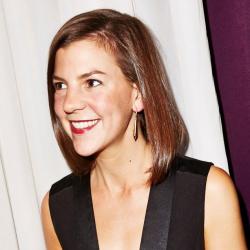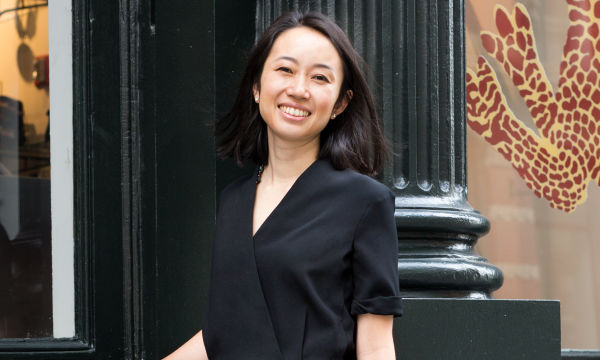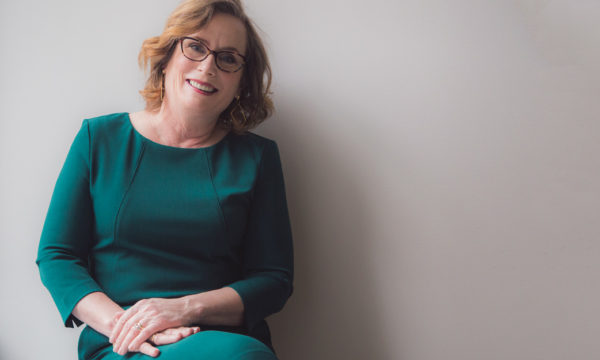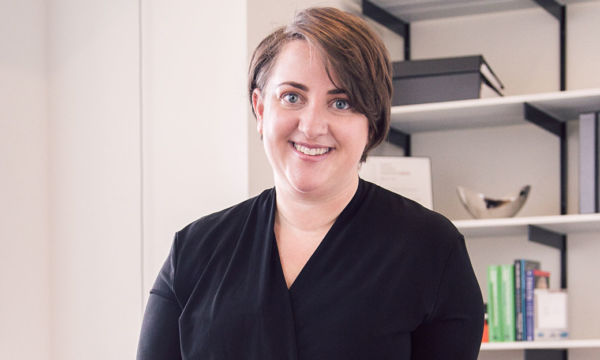A Lawyer of Many Talents: Lara Bazelon Talks Family, Justice, and Ambition
December 01, 2017 | Filed in: Woman of the Week
Lara Bazelon is proof that lawyers can wear many hats: She’s a professor, litigator, and contributing writer for Slate, where she has a long-running series about criminal justice and modern family life. Her op-eds and essays have also been published in the New York Times and The Washington Post, among other outlets. Next year, she’ll add “author” to her list of titles when her book about wrongful convictions is published. Here, she talks about career setbacks, challenges for women in the courtroom, and overcoming the stigma of a painful divorce.
I WENT TO LAW SCHOOL because I wanted to be a public defender; I wanted to represent people who had the odds stacked against them. After I clerked for a federal judge, I got a job in the public defender’s office in Los Angeles. My first trial was a serious felony case, and I was thrown right in: I gave the opening statement in front of the jury. I had supervision, of course, but that office really expected you to rise to the occasion. I just loved the work—it was like pulling a rabbit out of a hat. My clients were incredibly diverse, and I had all different kinds of cases, from bank robberies to drug conspiracies to assaults on federal officers. I spent about seven years there, and I just loved it.
I’VE BEEN A TRIAL LAWYER for 17 years, and over time, I’ve had various gender-specific experiences. I had a male supervisor who would tell me, “There are things that I can do that you can’t do, and vice versa.” What he meant was, “Don’t be too aggressive. You can’t go mano a mano with a witness.” Meanwhile, I was encouraged to take a more humanizing tack with clients, and get into more sensitive areas with witnesses, particularly victims. Still, I always felt that I was starting at a bit of a disadvantage where people, whether it was opposing counsel or even sometimes my clients, questioned my competence because I’m a woman. I’ve been mistaken for a secretary or a paralegal before. Recently, a judge mistook me for one of my students. And the message is, “You don’t look like a real lawyer.” I internalized that to push myself to prove that I was a good lawyer. I think I was successful, but the drive to prove myself has never really gone away.
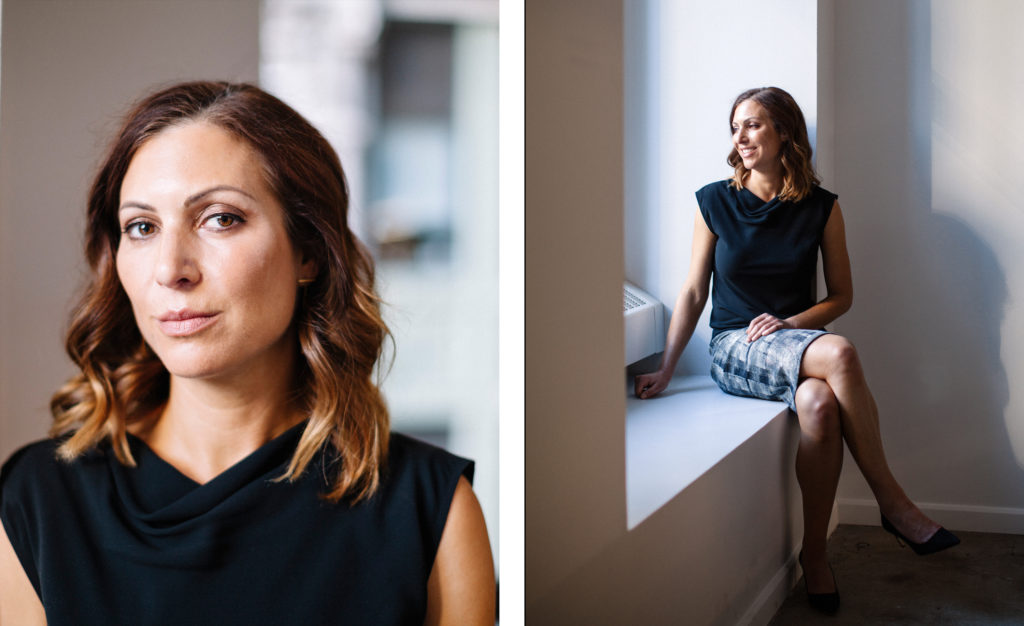
Lara wears the Rowling top in black, the Noho skirt in scratch plaid, the Vanessa pump in black, and the Bardi earrings in yellow gold.
MY FIRST MAJOR CAREER SETBACK happened a few years into my job. I had a very serious case, and I tried it twice. The first time there was a hung jury, and then there was a second trial, so I had the case for 18 months. In the end, the client was convicted, and he got a mandatory life sentence. He was 45 years old, and he is never getting out of prison. I felt this tremendous sense of responsibility, and I was terribly, terribly upset. I had worked as hard as I possibly could, but it was such a horrible result that I questioned whether I had the ability to do this work anymore. When I got back to the office that night, I happened to get into the elevator with one of my supervisors, who’s now a judge. He took one look at me and said, “What’s wrong?” I started to cry right there. He said, “This isn’t your fault. You weren’t personally responsible for all of the things that led to this outcome. You’re a wonderful lawyer. You’re a wonderful person. You need to keep doing this work.” He didn’t try to trivialize it, and he made me realize I needed to keep going. He’s one of those guys who carries a handkerchief, and, of course, I blew my nose in it. I didn’t feel better overnight, but he helped me realize that I should push through.
I HAVE ALL FEMALE LAW STUDENTS in my clinic this semester, purely by happenstance. There are five of them, four of whom are women of color. I tell them, “You’re going to have to work twice as hard to be considered just as good, because unfortunately, there are stereotypes about what female lawyers are capable of.” To teach them how to be forceful advocates, I want to instill a sense of confidence and hope, but also brace them for what’s coming. We have very honest conversations in class where we strategize on what to wear, how to speak, and the specific challenges that they face as women and as women of color. I also say, “It’s difficult, but don’t take it personally. You need to be resilient. You need to absorb these things and metabolize them, and use them as fuel to work harder and be better at your job.” I’m not telling them anything that they haven’t experienced in life, but I think it’s important to say, “In the courtroom, these biases are very real.”
I MOVED TO SAN FRANCISCO for family reasons in 2009. I decided to do a combination of teaching and litigating, and I got the opportunity to direct an innocence project at Loyola Law School in Los Angeles. That was a game-changing experience for me, in terms of what I wanted to study and write and think more about. I commuted from San Francisco to L.A. once a week for over three years to do the job, and it was tough. I felt very torn—I wasn’t spending enough time at work, and I wasn’t spending enough time with my kids. Getting on a plane every week became exhausting. But at the same time, I loved my job, and I didn’t want to leave. So I did it for as long as I could.
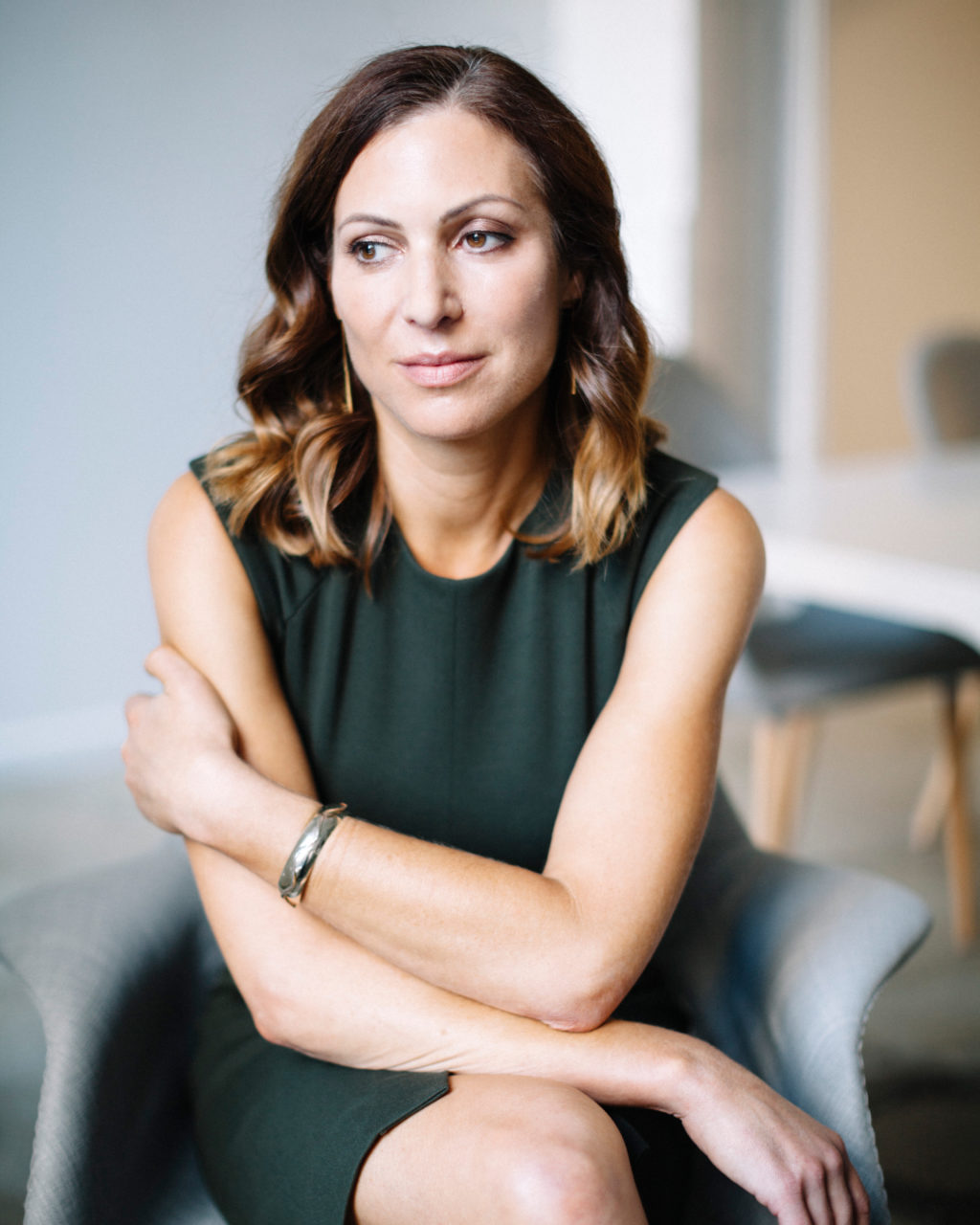
Lara wears the Katie dress in dark pine and the Telesto earrings in brass.
IN YOUR THIRTIES, you’re achieving more professionally and getting more opportunities, but in many cases you also have a growing family, so you have demands on your time that you didn’t have in your twenties. At least, that was true for me. What ended up happening—and I think this happens to a lot of women—is that you reach this breaking point where you can’t do it anymore. I remember waking up one morning in September 2015 and realizing, “My thirties are over. My job is over. My marriage is over. I have to build a new life.” So that’s what I did. I had to re-chart what I wanted my life to look like, and it felt like jumping off a cliff.
THE STANDARD STORIES ABOUT DIVORCE are all bad. When I was growing up, it was like, “Dad moved out. He lives in an efficiency apartment. He makes Chef Boyardee meals for his kids when they see him every other Sunday.” Or, “Mom and Dad hate each other.” When I got divorced, I felt very ashamed. I felt that it was the worst failure of my life, and I had all this guilt about my kids. Then, gradually, I realized that it doesn’t have to be that way. We’ve very consciously tried to live as a modern-day divorced family. No, it’s not ideal, but you can make it work, and there can be joy and wonder in it, too. I wrote a piece [published in the Times] to turn that narrative around and say, “Sometimes you can’t live with your spouse anymore, and you do get a divorce, but you can remake your family.” My thinking was, if I can tell that story, would that be helpful to people who are in a similar situation, who are feeling such failure and shame and anger?
WHEN YOU GO THROUGH A DIVORCE, you want to make sure that your kids’ lives are as stable as possible, and I wanted to maximize the time I had with them and not be constantly stressed, checking my phone, worried about what was happening 500 miles away in my office. And that’s when my literary agent and I got together and conceived of this idea for a book. That was great, because it allowed me to spend the next 18 months writing it, which is an incredibly hard job, but also a very flexible one. I was lucky that I sold the book, and lucky that I was so in love with the idea.
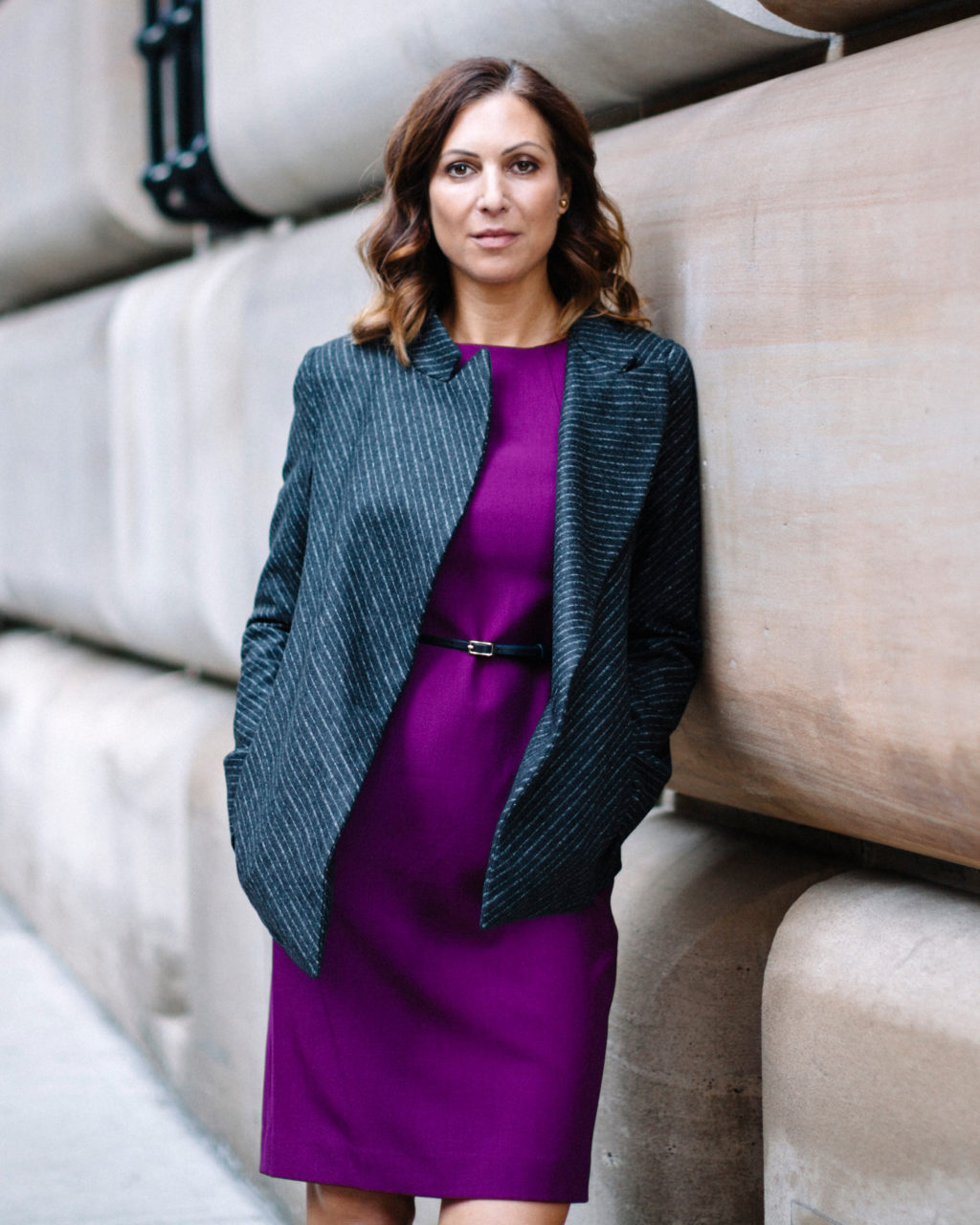
Lara wears the Etsuko dress in deep plum and the Oliver jacket in etch stripe.
THE IDEA FOR MY BOOK came out of a case that we worked on at Loyola’s Project for the Innocent. We represented a guy named Kash Register—that was his real name—who had been convicted of murdering someone in 1979, when he was 18. He spent his twenties, thirties, forties, and most of his fifties incarcerated, and he was innocent—it was overwhelmingly obvious, and we were able to prove it. The whole time I was representing him, I was focused on winning. I didn’t think, “What’s his life going to be like once he’s free?” And what happens to the victim’s family, who are told, “We got the guy. He’s in prison. Don’t worry,” and then all these years later they find out it was the wrong person? It’s devastating. There are these concentric circles of harm. It’s easy to create a fairy tale exoneration narrative, where you have this incredibly sympathetic protagonist who survives these terrible trials, then goes free and rides off into the sunset. And that’s not true. It’s more like an earthquake—afterwards, your whole landscape is in ruins.
I TRY TO MODEL FOR MY STUDENTS and mentees that there is no such thing as a perfect trial lawyer or a perfect law professor. I think younger people tend to put figures of authority on a pedestal and think, “Well, they’re the experts, and they know everything.” I’m very conscious about saying, “Look, I make mistakes all the time. I’m constantly striving to better myself.” I think it’s really important to model that, so that the whole task of becoming a professional person in the world, especially a professional woman, isn’t so daunting. There isn’t some magical point where you have it all figured out. It takes a certain level of humility to accept that, because we all want to be seen as authority figures. But I think you become more biased if you see yourself that way. Yes, of course you want to celebrate victories, but you also want to drill down on the less ideal outcomes, which you’re always going to have.
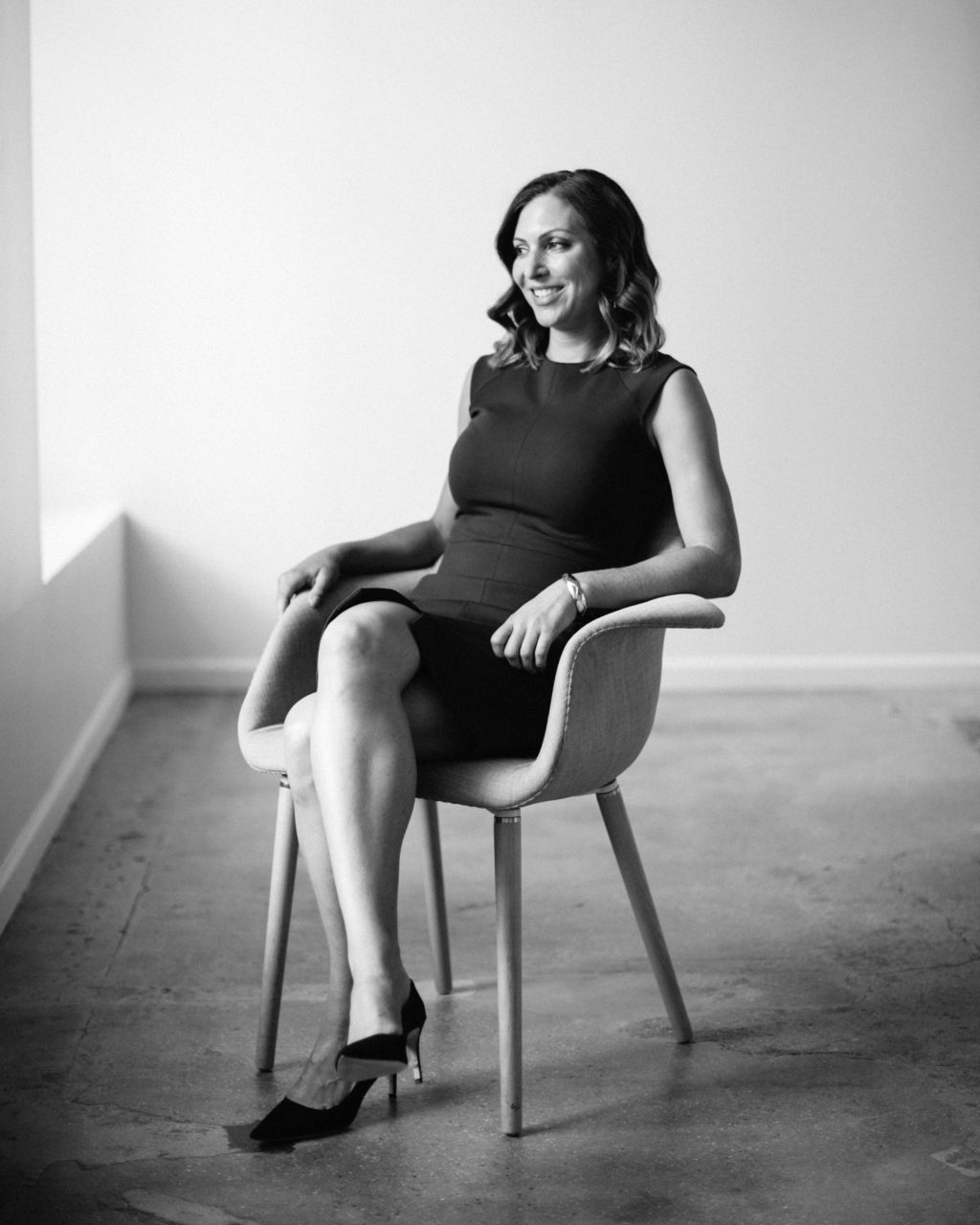
Lara in the Katie dress in dark pine and the Vanessa pump in black.
Photos by Rich Gilligan






